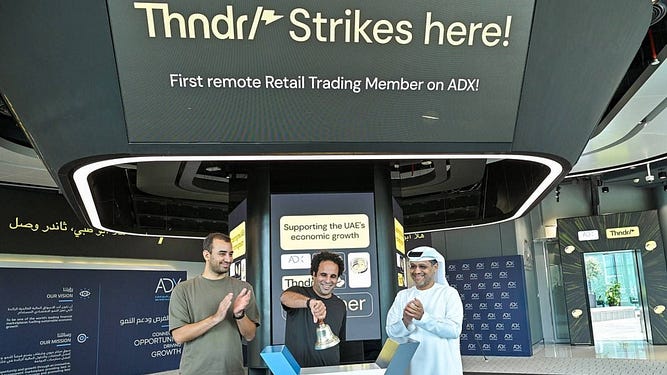The Abu Dhabi Securities Exchange (ADX) has enlisted an unlikely ally in its race against regional rival, the Saudi Tadawul: a Cairo-based fintech. Thndr, an Egyptian investment app, has become the first international retail broker to gain remote trading access to the ADX, a move that could funnel thousands of young, digital-savvy investors into the UAE’s capital market.
The partnership is a strategic play by Abu Dhabi to boost liquidity and challenge the dominance of Saudi Arabia’s exchange, the largest in the Arab world. By leveraging Thndr’s user base, ADX is betting on retail investors from across the Middle East to become its competitive edge.
“This partnership gives our users the chance to invest in one of the region’s strongest-performing markets,” said Ahmad Hammouda, Co-founder and CEO of Thndr. “It also opens doors to exposure within MENA through Tabadul as well as beyond MENA.”
Why It Matters: The ‘Remote’ Revolution
The key to this deal is Thndr’s new status as a “remote trading member.” This model scraps the old, expensive requirement for international brokers to have a physical office in the UAE. By removing this barrier, ADX is opening its doors to a new class of nimble, digital-first brokers focused on retail investors, not just large financial institutions.
For the ADX, it’s a direct pipeline to foreign retail investment. For Thndr’s users, who are mostly young Egyptians, it’s a golden ticket to directly trade stocks and ETFs in one of the region’s top-performing markets, diversifying their portfolios beyond their home country.
Abdulla Salem Alnuaimi, Group CEO of ADX, called the onboarding a “transformative step in creating tangible trading bridges across the region’s capital market,” highlighting the exchange’s push for greater financial inclusion.
Abu Dhabi’s Strategic Play
This is more than just a new membership; it’s a calculated move to close the gap with the Saudi Tadawul. As of late 2024, ADX boasted a market capitalization of AED 2.9 trillion (approximately $790 billion), making it the second-largest exchange in the Arab world. Its growth has been fueled by a surge in high-profile IPOs and innovative products like derivatives.
By integrating a platform like Thndr, ADX aims to:
- Increase Liquidity: Onboarding thousands of new retail investors from Egypt and beyond will increase trading volumes.
- Attract Foreign Capital: The move directly funnels retail-level foreign investment into the UAE market.
- Strengthen Tabadul: The partnership is a key proof-of-concept for ADX’s Tabadul hub, an initiative launched in 2022 to link regional exchanges and allow cross-border trading.

Thndr’s Rise
Launched in 2020, Thndr has been pivotal in making investing mainstream in Egypt. Often called the “Robinhood of the Middle East,” the startup has seen explosive growth by simplifying access to financial markets.
The company has raised a total of $39.2 million from major investors including Prosus Ventures, Tiger Global, and Y Combinator. Its success is built on a commission-free model and a strong focus on financial education for first-time investors.
Key Thndr stats:
- Users: Over 1 million users added in 2024.
- Beginner Focus: In 2021, 87% of its users had never invested before.
- Market Impact: The company accounted for 36% of all new registrations on Egypt’s stock exchanges that year.
“Seventy-five percent of our users made their first investment on Thndr with less than $500,” said Seif Amr, Thndr’s COO. “Without Thndr, they wouldn’t even be able to open a brokerage account.”
The partnership between a legacy institution like the ADX and a startup like Thndr signals a maturing MENA financial ecosystem. There’s a massive untapped market: fewer than 3% of individuals in the region are active retail investors, compared to over 50% in developed markets.
This collaboration is a blueprint for how legacy exchanges can partner with agile fintechs to modernize, boost competition, and build a more interconnected regional economy. For Thndr, this is just the beginning of its regional expansion, with plans to add access to U.S. stocks and secure licenses in other GCC countries.
“Investing should not be a privilege reserved for the wealthy,” said Hammouda. “It should be as easy and accessible as sending a message on your phone. That’s the future we’re building for the region.”


